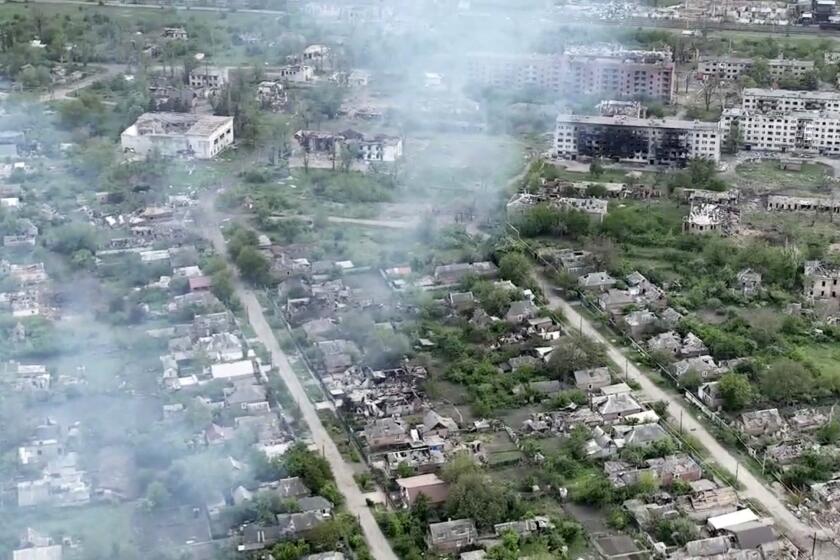Attorney in ‘Sleeping Lawyer’ Case Hits Roadblock in Texas
After waging a 15-year battle all the way to the U.S. Supreme Court to convince the legal system that Calvin J. Burdine should not be executed because his attorney slept through significant portions of his 1984 murder trial, Burdine’s appellate lawyer is engaged in a new legal fight over whether he can continue working for Burdine.
In Houston, Harris County Judge Joan Huffman ruled in late June that she will not appoint Robert McGlasson to represent Burdine, 49, in his retrial on charges that he stabbed his roommate to death in 1983. Huffman said that, even though McGlasson was entitled to continue representing Burdine, she would not permit him to be paid with state funds.
The judge said that McGlasson, a Yale Law School graduate who once ran a death penalty defense project in Texas and is a federal public defender in Atlanta, is not on a recently created list of lawyers qualified to handle capital cases in Harris County.
“I intend to follow the rules, as I believe I’m required to do,” Huffman said at a June 26 hearing.
Attorneys in Texas say Huffman’s actions are bizarre and ironic in several regards. Prime among them is that McGlasson is a highly experienced capital litigator, a member of the Texas bar, said Austin lawyer David Botsford, who has litigated several cases involving similar representation disputes. And McGlasson clearly could handle the case much more efficiently and with less expense to taxpayers than any other lawyer because he has a rapport with Burdine and is familiar with the case’s voluminous record, Botsford said.
Moreover, Harris County created the list of approved lawyers last year to improve the quality of representation for indigent defendants--a requirement of reforms passed by the state Legislature in no small measure because of the Burdine case.
The case came to national attention during the 2000 presidential election, when reporters questioned then-Gov. George W. Bush about “sleeping lawyers” in Texas death penalty cases.
Burdine was “the poster child that symbolized the failure of the Texas approach to indigent defense, and indigent capital defense in particular,” said Bill Beardall, executive director of the Equal Justice Foundation in Austin who played a key role in getting Texas’ Fair Defense Act passed.
“Now you might have the new reform designed to prevent what happened to Burdine coming back to his detriment. No one intended for that to happen,” he said.
Beardall also emphasized that the Fair Defense Act, cited by Huffman, does not apply to crimes that occurred before Jan. 1.
On June 21, Burdine, who was granted a new trial by a federal appeals court last year, filed an affidavit with Huffman seeking continued representation by McGlasson. “I am very confident in Mr. McGlasson.... He knows me and my case better than anybody. I trust him. I can talk to him,” Burdine wrote.
“After my first trial,” in which court-appointed attorney Joe Frank Cannon was asleep for significant periods of time, “it took me a very long time to be able to trust even Mr. McGlasson. I know that I will not be able [to] trust another lawyer very quickly, especially not without Mr. McGlasson being there with me,” Burdine added.
McGlasson said he would take a leave of absence from his job in Georgia, would handle the case for the same court-appointed fees that any other lawyer would get and would not seek travel expenses.
But at the June 26 hearing, Huffman made it clear that she would not appoint McGlasson, meaning if he wanted to continue to represent Burdine, he would have to do it on his own nickel.
“You obviously have a right to represent Mr. Burdine,” Huffman said. “And if you want to sign on the case, I’m going to do nothing to terminate that relationship. The whole crux of this is whether I’m going to appoint you and you’re going to get paid for it. We all know that’s what we’re talking about.”
After McGlasson made it clear that he intended to challenge this decision, Huffman, who worked as an assistant district attorney in Houston for 14 years before being elected a judge in 1998, said she intended to appoint veteran Houston attorney Anthony Osso to represent Burdine and scheduled a retrial for Oct. 7.
Osso, whose knowledge of the case is limited to what he has read in newspapers, said last week that his appointment is on hold until Burdine’s challenge is resolved.
The Harris County district attorney’s office has taken no position on the dispute. “That’s between the judge and Mr. Burdine’s lawyers,” Assistant Dist. Atty. Paula Storts said.
Last Monday, the Texas Criminal Defense Lawyers Assn. and the National Assn. of Criminal Defense filed suit in the Texas Court of Criminal Appeals asking the court to order Huffman to appoint McGlasson. The lawsuit contends that Huffman is required under the 5th, 6th, 8th and 14th amendments to the U.S. Constitution and sections of the Texas Constitution to reappoint McGlasson.
Burdine’s defense “has been thrown into disarray by the effective removal of McGlasson,” the suit states.
“[Huffman] threatens to turn what is supposed to be a fair adversarial event into a decidedly lopsided one,” reads the brief filed by H.F. Rick Hagen of Denton and Lisa Kemler of Alexandria, Va.
“The fundamental issue in this proceeding is the extent to which the trial judge may permissibly interrupt or interfere with a long-standing and existing attorney-client relationship,” the suit states. Huffman’s “refusal to continue McGlasson’s appointment ... especially where McGlasson seeks appointment on the same terms as any other attorney ... is an unreasonable denial of [Burdine’s] right to effective assistance of counsel.”
Huffman has not filed a response, and under Texas legal rules there is no firm timetable for action on the suit.
The lawsuit notes that during the last decade McGlasson was appointed by a state judge and a federal judge in Houston to represent Burdine in separate proceedings seeking reversal of Burdine’s conviction and death sentence. Burdine has admitted that he was present when his former roommate, W.T. Wise, was robbed at his trailer in 1983, but he denies that he killed Wise. However, Burdine’s co-defendant pleaded guilty, got an eight-year sentence and testified against Burdine.
The suit emphasizes that there are numerous precedents--including three rulings in Texas since 1989 and decisions in California, Georgia and Louisiana--that a criminal defendant has the right to have continued representation from a lawyer with whom he has a long-standing relationship.
“Although an indigent defendant does not have the right to counsel of his own choosing, once counsel is appointed, the trial judge is obliged to respect the attorney-client relationship created through the appointment,” the Texas Court of Criminal Appeals ruled in 1992.
And Thursday, there was a reminder in the nation’s capital of the symbolic importance of Burdine’s case. After the Senate Judiciary Committee approved the Innocence Protection Act--which, among other things, is designed to raise the quality of attorneys in death penalty cases--Sen. Patrick J. Leahy (D-Vt.), the bill’s main sponsor, said if the bill becomes law, “we will finally put an end to the sleeping lawyer syndrome.”
And the Houston Chronicle, in an editorial Thursday headlined, “He’s Awake,” urged Huffman to reconsider her decision--and at the very least, appoint McGlasson as co-counsel for Burdine. Harris County had already “suffered enough embarrassment over the case that is known around the world as the ‘sleeping lawyer’ trial.”
More to Read
Start your day right
Sign up for Essential California for news, features and recommendations from the L.A. Times and beyond in your inbox six days a week.
You may occasionally receive promotional content from the Los Angeles Times.





